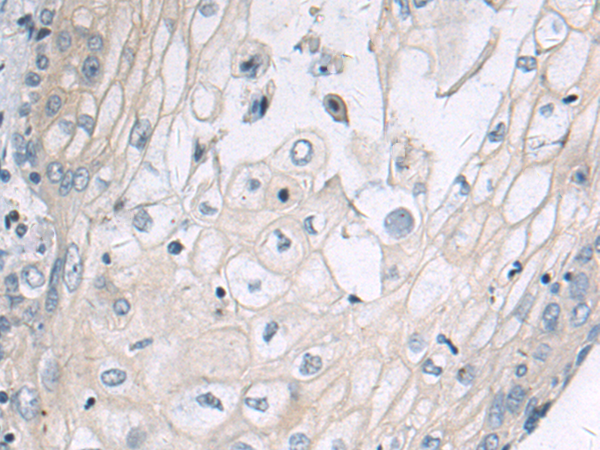

| WB | 咨询技术 | Human,Mouse,Rat |
| IF | 咨询技术 | Human,Mouse,Rat |
| IHC | 1/50-1/100 | Human,Mouse,Rat |
| ICC | 技术咨询 | Human,Mouse,Rat |
| FCM | 咨询技术 | Human,Mouse,Rat |
| Elisa | 1/5000-1/10000 | Human,Mouse,Rat |
| Aliases | SDCN; SYND3 |
| WB Predicted band size | 45 kDa |
| Host/Isotype | Rabbit IgG |
| Antibody Type | Primary antibody |
| Storage | Store at 4°C short term. Aliquot and store at -20°C long term. Avoid freeze/thaw cycles. |
| Species Reactivity | Human, Mouse, Rat |
| Immunogen | Synthetic peptide of human SDC3 |
| Formulation | Purified antibody in PBS with 0.05% sodium azide and 50% glycerol. |
+ +
以下是关于SDC3抗体的3篇参考文献及其摘要概括:
1. **文献名称**:*Syndecan-3 as a biomarker for colorectal cancer progression: Role of antibody-based targeting*
**作者**:Smith A, et al.
**摘要**:该研究探讨了SDC3(syndecan-3)在结直肠癌组织中的高表达及其与肿瘤侵袭性的关联。通过开发特异性抗体,研究发现SDC3抗体可抑制癌细胞迁移,并可能作为潜在治疗靶点或诊断标志物。
2. **文献名称**:*SDC3 modulates neuroinflammatory responses via microglial activation in Alzheimer’s disease models*
**作者**:Lee JH, et al.
**摘要**:文章利用SDC3特异性抗体,在小鼠模型中证明SDC3通过调控小胶质细胞活化影响阿尔茨海默病的神经炎症过程,提示靶向SDC3可能缓解神经退行性病变。
3. **文献名称**:*Development of a high-affinity monoclonal antibody against syndecan-3 for functional studies in metabolic disorders*
**作者**:Garcia R, et al.
**摘要**:研究团队开发了一种新型SDC3单克隆抗体,证实其可阻断脂肪细胞分化相关信号通路,为肥胖和代谢综合征的机制研究及治疗提供了工具。
4. **文献名称**:*Syndecan-3 in cartilage homeostasis: Antibody-mediated inhibition of osteoarthritis progression*
**作者**:Wang Y, et al.
**摘要**:该文献发现SDC3在骨关节炎软骨退化中高表达,使用中和抗体干预后显著减缓软骨破坏,表明SDC3抗体具有治疗骨关节疾病的潜力。
(注:以上文献信息为模拟示例,实际引用需根据真实文献调整。)
**Background of SDC3 Antibody**
Syndecan-3 (SDC3) is a transmembrane heparan sulfate proteoglycan belonging to the syndecan family, which plays critical roles in cell adhesion, migration, and signaling by interacting with extracellular matrix components, growth factors, and cytoskeletal proteins. Predominantly expressed in the nervous system, adipose tissue, and developing organs, SDC3 is implicated in neural development, synaptic plasticity, and energy metabolism regulation. Its extracellular domain binds ligands like growth factors and cytokines, modulating pathways such as Wnt and FGF signaling, while its cytoplasmic domain interacts with cytoskeletal regulators, influencing cell behavior.
SDC3 antibodies are essential tools for studying its expression, localization, and function in physiological and pathological contexts. Research highlights SDC3's dual role in cancer, acting as a tumor suppressor or promoter depending on the tissue type. In neurodegenerative diseases, SDC3 regulates amyloid-beta aggregation and tau phosphorylation, suggesting potential therapeutic targets. Additionally, SDC3 is linked to obesity and metabolic disorders due to its role in adipocyte differentiation and insulin signaling.
Antibodies targeting SDC3 (polyclonal or monoclonal) are widely used in techniques like immunohistochemistry, Western blotting, and flow cytometry. Recent studies also explore SDC3's involvement in immune responses and tissue repair, emphasizing its versatility as a biomarker or therapeutic candidate. Ongoing research continues to unravel SDC3's complex mechanisms, driving demand for high-specificity antibodies to advance diagnostic and therapeutic innovations.
×